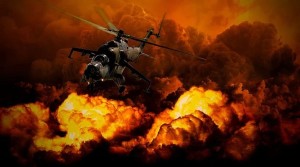“Arguing in favor of finding a solution to our dilemma that does not involve forcing President Assad to put all his war crime eggs in one Cyrillic basket.”
 Tehran, May 7 – Officials in the regime of Ayatollah Ali Khamenei voiced hesitation this week over what appears to signal the beginning of the retrenchment of their forces in Syria following a rising price tag in manpower, materiel, and expenditures there in the face of determined Israeli, US,and Turkish efforts in opposition, as the officials expressed concern that without their assistance, Syrian President Basher Assad will have only Russia upon whom to rely for logistical and tactical support in continuing to massacre Syrian civilians.
Tehran, May 7 – Officials in the regime of Ayatollah Ali Khamenei voiced hesitation this week over what appears to signal the beginning of the retrenchment of their forces in Syria following a rising price tag in manpower, materiel, and expenditures there in the face of determined Israeli, US,and Turkish efforts in opposition, as the officials expressed concern that without their assistance, Syrian President Basher Assad will have only Russia upon whom to rely for logistical and tactical support in continuing to massacre Syrian civilians.
Deputy Minister of Defense Aidan Anabettin issued a memorandum Wednesday to colleagues in the country’s defense establishment expressing concern over the void Iran will leave in Syria if the planned withdrawal of support and manpower goes through, as President Basher Assad will no longer have anyone but Vladimir Putin’s Russian forces available to support and participate in indiscriminate bombing and shelling of rebel-held areas. The memo leaked last night.
“I worry that our friend and comrade President Assad will find himself unable to call on more than just Russia in his effort to kill hundreds of thousands and displace millions more,” wrote the deputy minister. “Ultimately the decision lies with others whose experience and authority outweigh my own, but I simply wish to go on record arguing in favor of finding a solution to our dilemma that does not involve forcing President Assad to put all his war crime eggs in one Cyrillic basket.”
Anabettin’s memo reflects frustration on the part of at least some Iranian defense officials at the country’s inability to maintain its ambitious efforts to attain regional hegemony, as well at their own limited capacity to influence military decisions and policies by organs of the regime that answer directly to Supreme Leader Khamenei, over the heads of the rank and file.
Turkish troops have routed Iranian proxies in northern Syria in recent months, frustrating the Islamic Republic’s efforts to cement influence in the Syrian Arab Republic and to burnish its image as a competent military power. Israeli airstrikes over a longer period have degraded both Iran’s forces there and Syria’s own, causing the latter to question the wisdom and benefit of continued dependence on Tehran’s patronage. At the same time, American-led economic sanctions against Iran to dissuade the regime from its pursuit of ballistic missiles and nuclear weapons have sent Iran’s economy reeling and hampered its attempts to project power in the region.
The deputy minister added that he harbors no worries about Russia’s capacity or will to take up the slack in perpetrating or facilitating massacres of Syrian civilians and prisoners, but believes that having diversity among the perpetrators can only bring positive outcomes in the social sphere.
Please support our work through Patreon.




